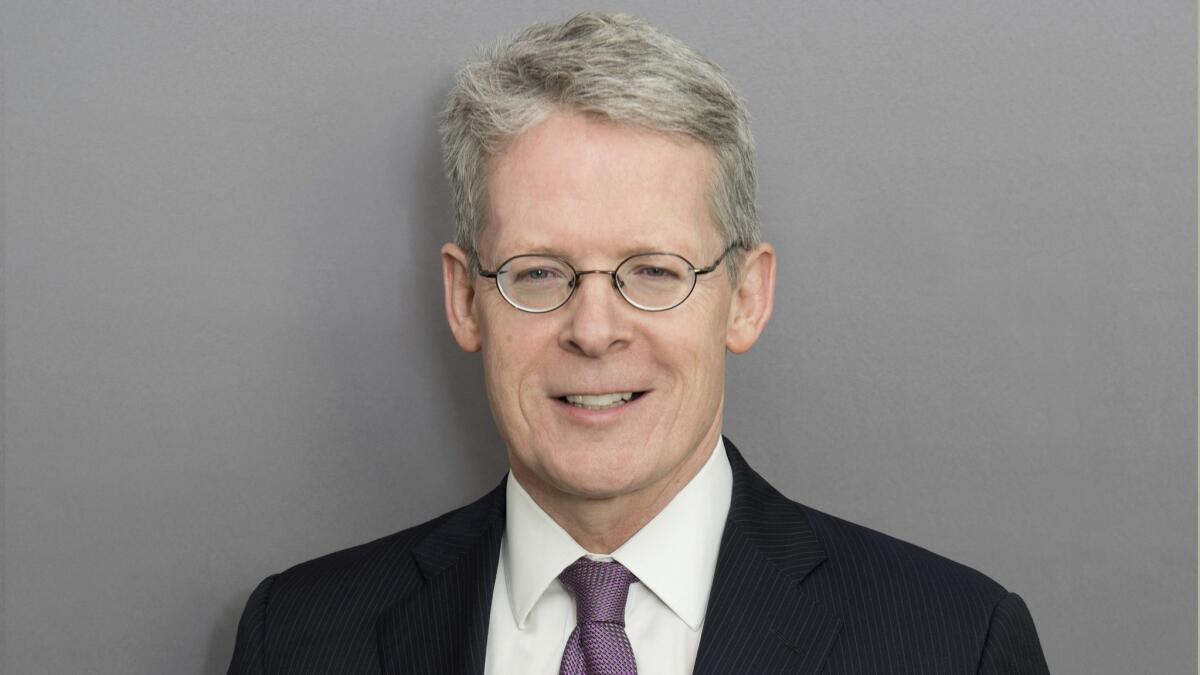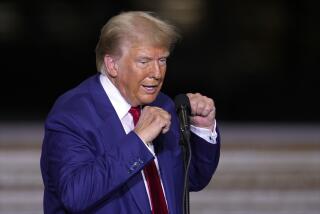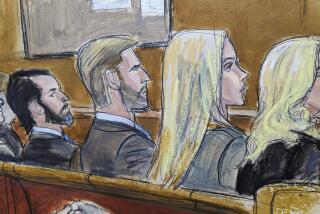Attorney Emmet Flood, well-versed in White House scandals, takes President Trump as a client

Reporting from Washington — As a postdoctoral fellow in 1988, Emmet Flood burnished his academic credentials when International Philosophical Quarterly published his lengthy paper on “The Confessions of St. Augustine,” the 13-volume, deeply introspective autobiography of the early Christian saint who saw himself as a sinner.
“God cannot be persuaded by rhetorical appeals,” Flood wrote. “He already knows the ‘facts’ of Augustine’s case; and furthermore, He has perfect knowledge of all the possibilities of their presentation.”
Flood may find solace in that perspective as President Trump’s newest lawyer. He joins a White House under siege from special counsel Robert S. Mueller III’s investigation into Russian political interference, and a legal team buffeted by resignations and a shoot-from-the-id client.
There’s also a potential threat from Congress if Democrats win back the U.S. House in November and regain the power to blanket the Oval Office with subpoenas, or even start impeachment hearings. Activists like billionaire donor Tom Steyer are already pushing to remove Trump from office.
Unlike former New York City Mayor Rudolph W. Giuliani and conservative lawyer Jay Sekulow, who represent Trump personally, Flood will be responsible for shielding the institution of the presidency and the White House from legal problems.
Flood has the resume for it, having worked for two previous presidents. He helped fend off Republicans trying to remove Bill Clinton from office in the late 1990s, and sparred with Democrats probing George W. Bush’s controversial dismissal of U.S. attorneys in 2006.
The high-wire work earned Flood a reputation as level-headed, passionate and scholarly. He also became known for his ardent defense of executive power — an expertise that could prove useful in trying to shield Trump from the Russia investigation.
“He’s the guy that I thought should have been hired for this in the beginning,” said Shannen Coffin, a partner at the Steptoe law firm who worked with Flood in the White House near the end of the Bush administration.
Glen Donath, a partner at Clifford Chance who worked with Flood on Clinton’s legal team during the impeachment process, praised Flood, saying he’s as “experienced as anyone I can imagine in taking on a challenge of this magnitude.”
“There are plenty of mines in this minefield,” Donath said. “But I have no doubt he’s well aware of them going in.”
Indeed, the explosions began only hours after the White House announced Wednesday that Flood would replace Ty Cobb, the second senior lawyer to leave Trump’s side in the last two months.
That night, Giuliani abruptly announced on Fox News that Trump had reimbursed Michael Cohen, his longtime personal lawyer, for $130,000 in hush money paid to the porn star known as Stormy Daniels. Trump confirmed it the next morning in a series of tweets.
The disclosure sent the White House into a scramble, since Trump had flatly denied in April that he knew about the payoff. Critics said the payment could represent a campaign finance violation because it was delivered 11 days before the election to keep Daniels quiet about her alleged tryst with Trump years ago.
Trump confused matters further Friday by telling reporters with a shrug that Giuliani still had to “get his facts straight,” and Giuliani issued another statement trying to walk back some of his comments.
The shifting stories highlight the challenge for Flood as he seeks to counsel a president who famously doesn’t listen to his lawyers or adhere to the truth.
Lanny Davis, who once represented Clinton, said Trump advisors and lawyers privately have expressed concerns about the president’s falsehoods, and have asked, “What do you do if you’re not sure that you’re getting all the facts from your client?”
Flood grew up in the Chicago suburbs as one of 14 children and attended Catholic schools as a boy. After attending the the University of Dallas as an undergraduate, he was awarded a doctorate in philosophy at the University of Texas at Austin. He continued postgraduate studies at Wesleyan University in Connecticut, where he wrote his erudite paper on St. Augustine.
But instead of pursuing a life in academia, he headed to Yale Law School. His work there was stellar enough that after he graduated in 1991, he landed a clerkship with U.S. Supreme Court Justice Antonin Scalia, the conservative stalwart who died two years ago.
Flood was driven more by the law than ideology, however. After working in private practice at the Washington firm Williams & Connolly, he joined Clinton’s legal team during the impeachment proceedings in 1998 and 1999. Clinton was impeached in the Republican-led House but acquitted in the Democratic-led Senate and served out his term.
Flood brought a scholarly approach that helped shaped Clinton’s legal strategy. Although he wasn’t well known, Flood became “one of the principle architects of President Clinton’s defense,” Donath said.
“Emmet feels that we should respect the results of valid elections and not use the impeachment process as another partisan tool when the opposing party doesn’t get the candidate they want in office,” Donath said. “He believes that in respect to President Clinton, and I suspect he believes that in respect to President Trump.”
It’s a view that likely appeals to Trump, who regularly accuses Democrats of supporting a “witch hunt” on the “hoax” that his advisors conspired with Russians trying to meddle in the campaign.
Flood would be prepared to face off with a hostile Congress if Democrats regain power in November. He joined the White House counsel’s office under Bush after Republicans lost both the House and the Senate in 2006.
“He was at the point of the spear in our relations with Congress,” said Coffin, who worked for Vice President Dick Cheney at the time. Despite the heavy demands, “Emmet had it under control,” Coffin said.
Flood handled the controversy after the White House fired several U.S. attorneys and Democrats accused the Bush administration of forcing out law enforcement officials to push a political agenda.
Flood’s opponents recall him as talented but stubborn, traits made clear in a closed-door questioning of Karl Rove, Bush’s top political advisor, according to a transcript that was released later.
Flood often stepped in to say certain inquiries were out of bounds. At one point he said he’d allow a question only because there was “no sense my wasting any more time than you are wasting.”
Elliot Mincberg, a lawyer who worked for Democrats running the House Judiciary Committee, said Flood stonewalled the panel’s attempts to obtain internal White House documents.
“Most people felt like we would be able to work something out. And we weren’t,” Mincberg said. “He just didn’t yield. Even an inch.”
It’s a very different approach than that of Cobb, who sought to cooperate with the special counsel in the Russia investigation. Trump’s legal team said in January that the administration had provided over 20,000 pages of documents and allowed more than 20 White House officials to be interviewed by Mueller’s team.
It’s still unclear whether Trump will sit down with the special counsel’s office. He appears to be laying the groundwork to reject an interview request — or even to fight a possible grand jury subpoena — although he said again Friday that he would like to testify if he thought he would be “treated fairly.”
“I would love to speak. I would love to go. Nothing I want to do more, because we did nothing wrong,” Trump told reporters outside the White House.
Then he made a promise that might unnerve Flood.
“If I thought it was fair,” Trump said, “I would override my lawyers.”
Follow the latest news of the Trump administration on Essential Washington »
Twitter: @chrismegerian
More to Read
Get the L.A. Times Politics newsletter
Deeply reported insights into legislation, politics and policy from Sacramento, Washington and beyond. In your inbox three times per week.
You may occasionally receive promotional content from the Los Angeles Times.











